by
Anne Patterson Friedman
It was background, and often enough foreground, for the bulk of Katya’s experience, which slowly, without notice, had condensed to form her snowbound mind. Throughout her stay on the icy world, she had seen no other life—no bugs, no shoots greening the bleak expanse. She knew of these in shadowed ways only, from frayed memories, from bedtime tales not wholly forgotten. And now, eyeing the spine of a curved white ridge, she wondered if Outpost 92A were not itself alive, a planet-sized armadillo curled into its sleeping self.
She stepped away from the transport’s wreckage and spotted water cascading from a cliff that used to stand dry. The change disturbed her, as did other mysterious happenings.
Lately, without warning, the ice would shake beneath her, rearranging the landscape. And the sun was harsher now, hitting outcrops with enough force to fling crisp shadows, shapes that teased Katya’s mind with imaginings both wondrous and horrible, like the dragon-headed weasel elongating at her feet.
Stranger still were the glowing triangles, yellow with a faint pattern of swirling blue lines. She’d seen them several times, rising from newly formed cracks. The flat wedges reminded her of paper airplanes, having two long sides and one short, but they were five times bigger, at least. They’d sail about, with the point of their narrow end leading the way, then spin high in the sky and disappear.
She stepped back to the wreckage and entered the transport’s cabin. Though torn open on one side, the space felt safe, for it held her father’s stasis tank. As she bent over the life-saving cylinder, snaps on her too-small jacket popped open, exposing a cartoon face on her T-shirt. The panda’s smile stretched horrifically as she reached to wipe frost from the tank’s display.
The gauges showed that her father’s injury remained stable, that he rested in dreamless sleep. Still, Katya worried. She had never known her mother, disease having stolen her away, so her father . . . no, she would not lose him, too. Unthinkable. But how long could stasis last? The crash seemed long ago, and she had grown much taller.
Drawing a heart through frost, she recalled her father’s words. Though weak and struggling to talk, he had told her that, eventually, rescuers would come, take them both back to Earth. Being a transport pilot, he would know such things.
Had he known the ice would crack? Once, on a previous trip, he’d told her that some worlds had longer years than others. Longer? Meaning . . . more months? She was turning seven in July, and spring had yet to come. Had her birthday passed, or was she still six? And the cracking ice—a sign of spring? She was so tired of it. So tired of the cold.
Hungry, she entered the cavernous cargo bay and wove through stacks of supplies meant for Outpost 92, the transport’s true destination. After standing undecided, hand serpentine above a jumble of cans, she made her choice and gripped a flat one labeled tuna. Her eyes flashed conquest, as if the bin were a sea, the can a flopping fish.
Perched on a crate, savoring her catch, she glanced at the hull, at its big, precise 92 and the scrawled-in A beside it. The letter had been her father’s idea, meant to comfort her. But she knew the real thing had trees, animals, and the laughter of others.
When the can was empty and her stomach full, she took her usual walk through the scattered field of wreckage. She knew every jagged piece and glanced at each in passing, sometimes sliding her hand along larger ones, leaving streaks through coatings of ash.
Rounding a crumpled thruster, she noticed the ice beside it had split open. She eased close to the rift and peered down at the glistening edge of a gray metal box. There lay the treasure her father had told her to find—the signal transmitter.
Shaking with excitement, she searched the thruster, yanked free a broken bolt as long as her arm, and used its sharp end to chip at the ice. Each strike of the heavy tool freed the box a little more, but also drained her strength. Though tempted to rest, she would not. She had searched for the box on every walk, with every step and every turn of her head. She would not give up until the treasure was in her grasp.
She slammed the bolt harder. It slipped, and her hand smashed against ice. When pain shot up her arm, she squeezed shut her eyes. No, she would not cry. No tears. Never, ever tears. If she let them out, they might not stop. Besides, they would only freeze to her face. Another slam of the bolt. Another.
She was heaving with exhaustion when the box finally slipped free. After carrying it to an open spot, she unhooked the latch and removed the cover. Could she do this? Yes, she remembered her father’s instructions. She activated the antenna, touched the silver square and then the red. The display lit up with blinking lights. So beautiful.
***
On a boulder with a smooth flat top, Katya sat, staring at the signal transmitter. Was it doing its job? It seemed a long while since she’d uncovered it.
Hearing a soft squeak, she scanned the area, which now had ice-free sections breaking the sea of white. A small black creature, no bigger than a mouse, sat nibbling something blue. It rose on spring-shaped legs, hopped across a mossy rock, and dove down a hole. No, she wasn’t alone.
She glanced around and grinned. Her eyes never tired of the sight—the green array that sprang now from the sparkly dirt. Stems, leaves, tendrils. Oh, and flowers! She raised a finger and counted. Twelve orange blooms, six purple ones.
When a shadow crossed her legs, she checked the sky and spotted a yellow triangle sailing past. She waved to it, as she always did when seeing one. It banked, flew down, and zipped by her head. She’d grown used to seeing them, so she wasn’t afraid. Once, eight of them, linked as a snaky line, had drifted through the transport’s cabin, pausing by each thing they passed as though curious to learn more about her.
She slid off the boulder and watched as another triangle joined the first in play. They dove over and under each other, and soon dozens more arrived. To Katya, their high-pitched chirping sounded like children laughing. When she giggled in response, they stopped in mid-flight and fell silent.
Had she disturbed them? She was about to walk away when their chirping erupted once more. One glided close, circled within reach, and hovered before her chest. She raised a trembling hand. When the triangle didn’t jerk away, she slid a finger along its velvety back. She felt a vibration, heard a purring noise, and watched its faint blue swirls brighten at her touch.
It tipped to the side, righted itself, and emitted a soft blue flash, a light that spread over Katya, sending warmth through her heart. Her new friend lingered a moment, then shot off toward the others. The group chattered and drew together. They interlocked to form a shape with head, body, legs, and tail. After flying around her like a playful animal, they broke apart and formed another creature, one with a round belly and tiny wings.
Laughing, Katya followed her friends around a stack of rocks, then stopped and stared. Before her loomed an odd sight—a yellow . . . thing. And, like the triangles, it had faint blue swirls spread across it. A plant? An animal? It was tall, at least five times her height, and seemed rooted in the ground. Its wide stalk sported ten or so fat arms, like a smooth cactus, slick with no thorns.
As the triangles fluttered around the arms, some merged with the surface, which matched them in color and texture. They reappeared—or were these new ones?—rising from the arms’ rounded tips.
Katya turned, looking for familiar landmarks. Yes, she wasn’t far from the thruster, in a place she’d been once before. At that time, there’d been no cactus-shaped thing, but there had been a crack in the ice. She recalled peering through the opening, seeing a layer of mushy yellow below. Had the odd yellow thing sprouted up from that? And the triangles, were they part of that thing? Its buds, its . . . children?
A low growl interrupted Katya’s thoughts. The triangles yelped and soared upward. All but one, that is. It hovered in front of her, rocking up and down. As it chirped by her ear, its voice grew louder, sounding frantic.
Then, from around a slope of dripping ice, a towering beast emerged. Katya gasped as it stomped its right foot. It headed for the cactus-like thing and opened its toothy mouth as if to take a bite. When Katya stumbled back, it whipped around to face her. Snarling, it shook its bulbous head, splattering her with stinging saliva.
She ran to the crumpled thruster, grabbed the broken bolt she’d stashed beside it, and hid within a fold of metal. Peeking through an open seam, she saw the beast lumbering toward her. It sniffed the air, wrinkling rubbery skin along its snout, then slammed against the thruster, rolling it over, exposing her.
When the hideous creature leaned toward her, a yellow triangle darted down and jabbed at its rippled hide. Distracted, it turned and swung a clawed hand. The triangle swooped and circled back, tilting just beyond reach, but the beast lunged, landing a blow. The triangle crashed to the rocks, twitched, and lay still.
Katya shuddered as angry black eyes turned toward her. She raised the broken bolt, but the creature, with one swipe to her shoulder, knocked her down. She rolled on her back and pointed the bolt upward, bracing its flat end on the stony ground.
Her attacker leapt, landing upon her. Then, squealing, it jumped back. It grasped at the bolt embedded in its chest and collapsed.
When her shaking eased, Katya struggled to her feet. She leaned over the motionless body, watching for the slightest movement. When confident the danger had passed, she opened her ripped jacket and pressed on her wound. Still, the blood oozed, soaking her shirt. As pain spiked though her shoulder, she grew faint and dropped to her knees.
There was no denying it: the dreaded time had come. She crawled toward the safety of the cabin, where her stasis tank waited, all prepped in case of need. She grasped at rocks, twigs, and furls of plants, pulling her body along. But within minutes, her muscles, having given all they could, would not respond.
On her back on a patch of ice, she watched dozens of triangles descend from the spinning sky. They flitted around her, interlocking to form a blanket shape. Then, squishy and warm, they worked beneath her, lifted her, and carried her along. Though her vision faded in and out, she noticed familiar passing shapes, shards of the wreckage. Yes, her friends knew where to take her.
She spotted the ragged roof of the transport’s cabin, heard her stasis tank open. The triangles laid her in and closed the lid. The tank was not coffin-shaped, she’d often told herself and did so again. The stabilizer’s hiss seemed a sigh that would not end, and Katya let it speak for her, let it carry her fear away.
Sleep crept, then, past her knowing and began a dream of water dripping. Each drop left something of itself behind, building the bud of an icicle, until there passed a moment leading no others. No plinking sound followed the last, for between point above and pool below, the wobble of liquid caught.
***
Katya opened her eyes to the face of a gray-bearded man. He spoke about a signal marking the way, about five Earthyears passing, about lost and lucky ducks.
He lifted her from the stasis tank, laid her on a shelf of soft grass, and held her still, explaining that she hadn’t moved for two of Earth’s months, so she shouldn’t just jump up. With a humming metal bar, he ran lights through her shoulder, sealing cuts.
She felt the hands before seeing the face. Her father knelt and pulled her close. She sank into arms that, though smaller than their memory, felt every bit as warm.
She wanted to believe she was safe at last, but her mind held doubts. Was the scene around her real? She felt strange, numb inside, as though still in stasis, still caught in that silent dream.
As her father, through broken sobs, thanked the gray-bearded man, Katya heard a faint, familiar sound. She raised her head and glanced around. A forest of cactus-like shapes spread out across a far plain, and from it, thousands of chirping triangles rose. They stopped in mid-flight and grouped together. Katya smiled when she saw the shape they formed: a human body, one hand raised and waving.
As quickly as they had gathered, the triangles flew apart. They dove back into the forest, back in the arms that had born them. A blue flash spread across the plain, a bright goodbye that lit Katya’s face, reached in, and entered her heart. Knowing then that she was safe at last, she freed her tears to fall.
Anne Patterson Friedman is a writer and artist. Her stories have appeared in Daily Science Fiction, 10Flash, Short-Story.Me, and Bards and Sages Quarterly. With her husband, she lives on and manages a wildlife sanctuary in South Florida. She blogs about her work at Eight Is 4 Infinity. annepattersonfriedman.blogspot.com
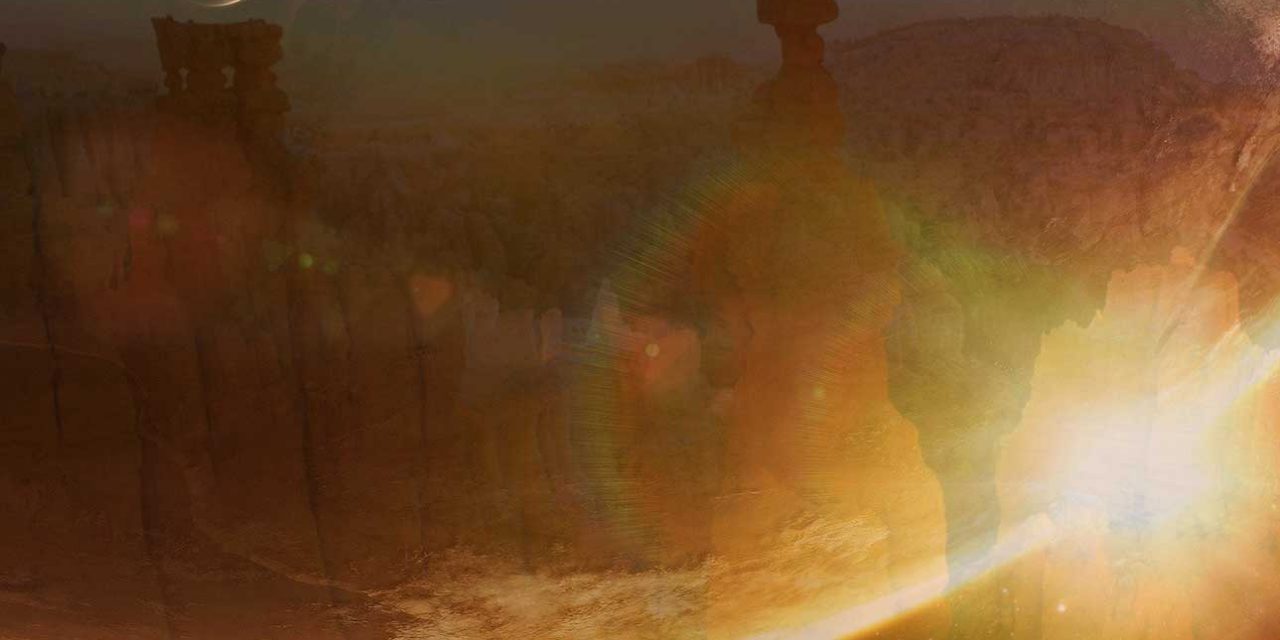
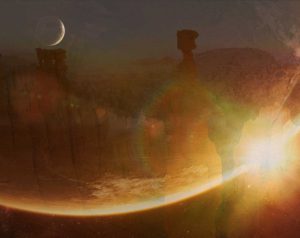
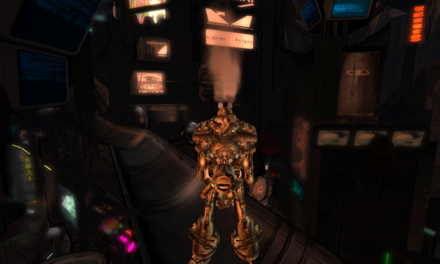
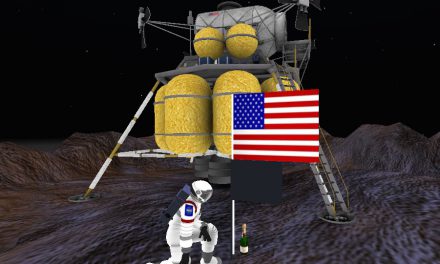
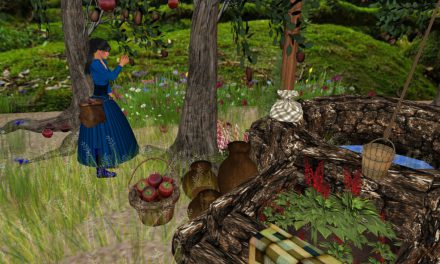

This is an awesome sci-fi adventure of a young lady’s survival on a hostile world.